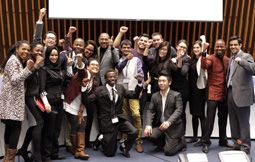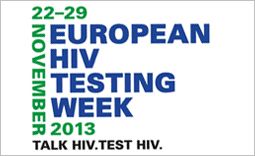
Feature Story
UN Secretary-General presents progress report on AIDS response
09 June 2010
09 June 2010 09 June 2010
At the 64th session of the General Assembly held on 9 June in New York, Deputy Secretary-General of the United Nations Dr. Asha-Rose Migiro on behalf of United Nations Secretary-General Ban Ki-Moon introduced the 2010 report on the progress made in the implementation of the Declaration of Commitment on HIV.
As part of the 2010 General Assembly AIDS Review, Mr Ban stated that the report puts forward "a set of recommendations that are ambitious, but achievable." He said the report, "presents a strong case for strengthening the links between the AIDS response and the other Millennium Development Goals".
In 2001 the Declaration of Commitment on HIV/AIDS mandated the UN General Assembly to review and debate an annual report by the Secretary-General on progress made in implementing the declaration. Its purpose is to identify problems and constraints, and present recommendations to make further progress in the AIDS response.
Expressing concern over governments cutting back on their response to AIDS to give more to other development efforts, the Secretary-General said, "The cost [of replenishment] may be great. But the cost of inaction will be even greater."
The report noted that the epidemic continues to outpace the HIV response: for every two people starting antiretroviral therapy, five are newly infected.
Recognizing the long-term benefits that will accrue from investing in HIV programmes, national governments and international donors should sustain and increase financial contributions to HIV programmes, it suggested.
The Secretary-General put special emphasis on the fifth MDG which focuses on maternal health, adding, "What is less well-known is that HIV is one of the leading causes of death among women of reproductive age worldwide.”
The report indicated that in 2007, one in five low- and middle-income countries achieved more than 50 per cent coverage of services to prevent mother-to-child HIV transmission, as well as antiretroviral therapy.
"A few years ago, tools to eliminate mother-to-child HIV transmission were just ideas. Now they are being put into practice all over the world," Mr Ban added.
Endorsing the strategic approach taken by UNAIDS to focus on ten priority areas under its Outcome Framework, Mr Ban said, "The Millennium Development Goals are indivisible and should never be pitted against each other."
Millennium Development Goal 6 calls to halt and begin to reverse the HIV epidemic by 2015. But unless the international community dramatically accelerates its efforts, we will not meet that target, the report noted.
It called upon stakeholders in the AIDS response to make a solid commitment towards eliminating mother-to-child transmission and optimizing the health of HIV positive mothers and their families.
It also advised national partners to begin planning now for long-term sustainability of antiretroviral therapy, including addressing the inevitable increase in demand for second- and third-line drug regimens.
Right Hand Content
Feature stories:
General Assembly review on HIV/AIDS 2009 (16 June 2009)
External links:
2010 General Assembly AIDS Review
Tools:
Photo Gallery of the General Assembly review on HIV/AIDS 2009
Publications:
Implementation of the Declaration of Commitment on HIV/AIDS and the Political Declaration on HIV/AIDS (pdf, 1.3 Mb.)
60/262. Political Declaration on HIV/AIDS (pdf, 55.8 Kb.)
2010 Report of the Secretary-General: Progress made in the implementation of the Declaration of Commitment on HIV/AIDS and the Political Declaration on HIV/AIDS (pdf, 1.47 Mb.)



